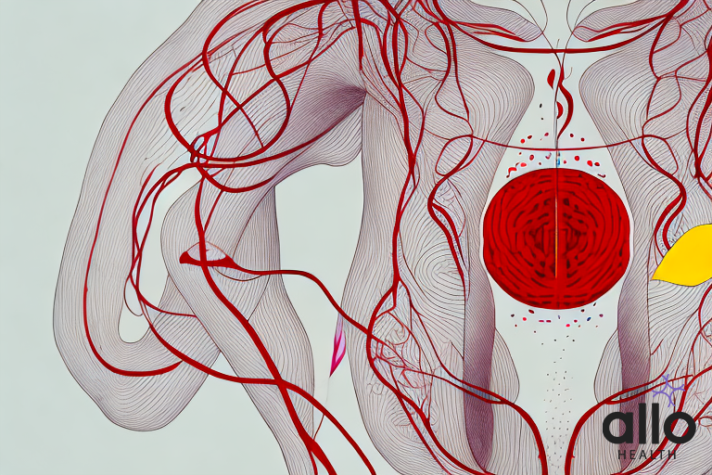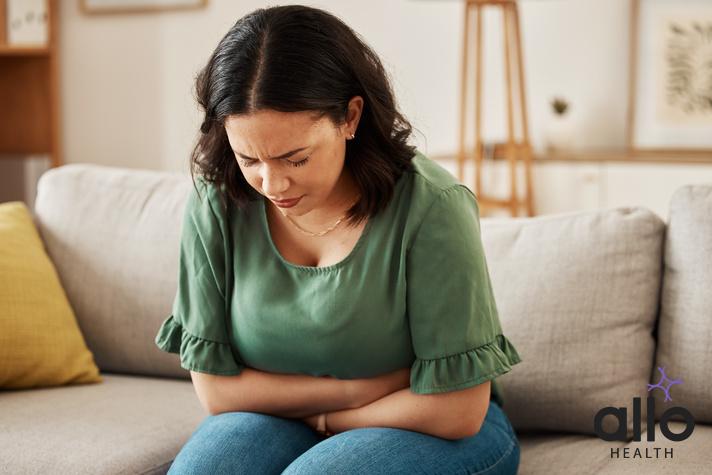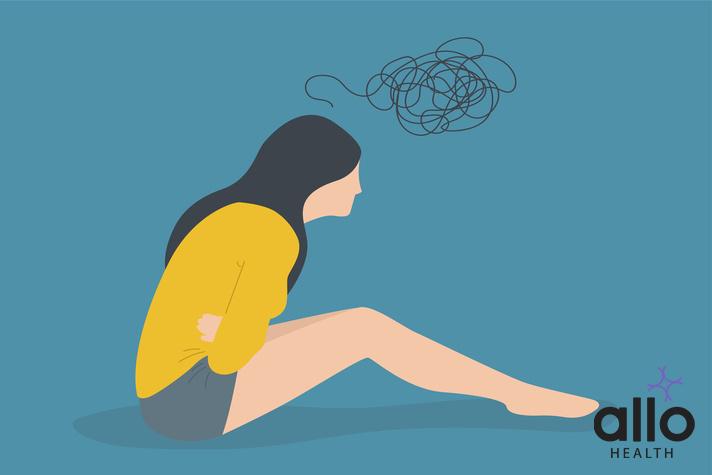Understanding Pain During Sex After Your Period

Allo Health is dedicated to personalized well-being, offering support and trusted information tailored to individual health goals. The platform emphasizes human-generated content, led by a distinguished medical team of experts, including physicians and sexual health specialists. Their commitment to credibility involves rigorous fact-checking, authoritative research, and continuous updates to ensure accurate, up-to-date information. Allo Health's unique approach goes beyond conventional platforms, providing expert-led insights and a continuous commitment to excellence, with user feedback playing a crucial role in shaping the platform's authoritative voice.

Dr. Raj. R holds an undergraduate medical degree from the Philippines, and has a bachelors background in Psychology. His experience working in the field of urology further brought his interest forward in working towards his passion of understanding the science of attraction, intimacy, sex and relationships. A key motto he practices by remains unprejudiced and non-judgemental care.
Why This Was Upated?
Our experts continually monitor the health and wellness space, and we update our articles when new information became available.
Updated on 24 May, 2024
- Article was updated as part of our commitment to diversity, equity, and inclusion.

"The following blog article provides general information and insights on various topics. However, it is important to note that the information presented is not intended as professional advice in any specific field or area. The content of this blog is for general educational and informational purposes only.
Book consultation
The content should not be interpreted as endorsement, recommendation, or guarantee of any product, service, or information mentioned. Readers are solely responsible for the decisions and actions they take based on the information provided in this blog. It is essential to exercise individual judgment, critical thinking, and personal responsibility when applying or implementing any information or suggestions discussed in the blog."
Sexuality is a fundamental aspect of human existence, and healthy sexual experiences are crucial for our overall well-being. However, for many women, pain during intercourse can be a frustrating and distressing experience. Pain during sex after your period, also known as dyspareunia, can occur for a variety of reasons. In this article, we will explore the possible causes of this condition, how to talk to your partner about it, and the different treatments available to help alleviate the symptoms.
Causes And Symptoms Of Pain During Sex
Pain during sex, also known as dyspareunia, can be a complex issue with various potential causes. It’s essential to note that experiencing pain during intercourse is not uncommon, and it can affect individuals of all genders and ages. Here are some potential causes and associated symptoms:
- Lack of arousal or lubrication:
- Causes: Insufficient arousal or inadequate lubrication can lead to friction during sex, resulting in pain.
- Symptoms: Discomfort or pain at the beginning of intercourse that may improve with increased arousal or additional lubrication.
- Vaginal dryness:
- Causes: Hormonal changes, certain medications, breastfeeding, or menopause can cause decreased vaginal lubrication.
- Symptoms: Dryness, burning sensation, or pain during penetration.
- Infections:
- Causes: Bacterial, yeast, or sexually transmitted infections (STIs) can cause inflammation and pain.
- Symptoms: Pain, itching, unusual discharge, or redness.
- Pelvic inflammatory disease (PID):
- Causes: Bacterial infection affecting the reproductive organs.
- Symptoms: Pelvic pain, abdominal discomfort, abnormal discharge, and pain during sex.
- Endometriosis:
- Causes: Tissue similar to the lining of the uterus grows outside the uterus.
- Symptoms: Pelvic pain, painful menstruation, and pain during or after sex.
- Uterine fibroids:
- Causes: Noncancerous growths in the uterus.
- Symptoms: Pelvic pain, pressure, and discomfort during sex.
- Ovarian cysts:
- Causes: Fluid-filled sacs on the ovaries.
- Symptoms: Pelvic pain, discomfort, and pain during intercourse.
- Musculoskeletal concerns:
- Causes: Conditions affecting the muscles or joints in the pelvic area.
- Symptoms: Pain during sex, especially with certain positions.
- Psychological factors:
- Causes: Stress, anxiety, past trauma, or relationship concerns.
- Symptoms: Pain during sex not associated with a physical cause, discomfort, or difficulty relaxing.
- Vaginismus:
- Causes: Involuntary muscle spasms in the pelvic floor.
- Symptoms: Difficulty with penetration, a sensation of tightness, and pain during intercourse.
- Post-surgical pain:
- Causes: Pain following pelvic or genital surgeries.
- Symptoms: Discomfort or pain during sex as a result of the surgery.
If you’re experiencing pain during sex, it’s crucial to consult with a healthcare professional. They can help identify the underlying cause and recommend appropriate treatment, which may involve medical interventions, lifestyle changes, or counseling, depending on the specific situation. Open communication with your partner and seeking support from a healthcare provider are essential steps toward addressing and managing pain during sex.

Can Having Sex During Your Period Cause Pain?
For many individuals, having sex during menstruation is a personal choice, and it can vary in terms of comfort and preferences. While some people may not experience any pain or discomfort during sex while menstruating, others may find it less comfortable or even painful. Here are some factors that can contribute to pain during sex during your period:
- Increased Sensitivity: During menstruation, the cervix may become more sensitive. Some individuals may find that their cervix is lower in the vaginal canal during this time, which can lead to discomfort or pain if it comes into contact with the penis or other objects.
- Menstrual Cramps: Menstrual cramps are common during menstruation. Intercourse may exacerbate cramping for some individuals, leading to discomfort or pain.
- Dryness: Menstrual blood can act as a natural lubricant, but it may not be sufficient for everyone. Some individuals may experience increased dryness during menstruation, which can contribute to friction and discomfort during sex.
- Infections: Although the risk is generally low, having sex during menstruation may theoretically increase the risk of infections. Any infection, such as bacterial vaginosis or a sexually transmitted infection (STI), can cause pain or discomfort during sex.
- Endometriosis or Pelvic Conditions: Individuals with conditions like endometriosis or other pelvic health concerns may experience increased pain during sex, regardless of the menstrual cycle. Menstruation can exacerbate these conditions, potentially leading to more significant discomfort.
- Psychological Factors: Some individuals may feel more self-conscious or anxious about having sex during their period, leading to increased tension or discomfort.
It’s important to note that many people engage in sexual activity during menstruation without experiencing any concerns. If you or your partner are experiencing pain during sex while menstruating, consider the following tips:
- Communication: Open and honest communication with your partner about your preferences, comfort levels, and any pain or discomfort you may be experiencing is crucial.
- Lubrication: If dryness is an issue, using additional water-based or silicone-based lubricants can help reduce friction and discomfort.
- Positioning: Experiment with different sexual positions to find ones that are more comfortable during menstruation.
- Pain Assessment: If the pain is persistent or severe, it’s advisable to consult with a healthcare professional to rule out any underlying medical conditions and discuss appropriate management strategies.
Remember that everyone’s experience is unique, and what works for one person may not work for another. It’s essential to prioritize your comfort and well-being and communicate openly with your partner about your needs and preferences. If pain persists or becomes a recurring issue, seeking guidance from a healthcare professional is recommended.
Understanding Pain During Sex After Your Period
Experiencing pain during sex after your period can be attributed to various factors, and it’s important to consider both physiological and psychological aspects. Here are some potential causes and explanations for pain during sex after menstruation:
- Residual Sensitivity: After menstruation, some individuals may still experience increased sensitivity in the pelvic area. The cervix, in particular, can be more sensitive during this time, leading to discomfort or pain during intercourse.
- Ovulation Pain: Some individuals may experience pain or discomfort during ovulation, which typically occurs in the middle of the menstrual cycle. This pain, known as mittelschmerz, can be felt on one side of the lower abdomen and may extend to the pelvic region, potentially causing discomfort during sex.
- Hormonal Changes: Hormonal fluctuations throughout the menstrual cycle can affect vaginal lubrication. After menstruation, there may be changes in hormone levels that impact natural lubrication, leading to increased friction and potential discomfort during intercourse.
- Pelvic Conditions: Conditions such as endometriosis, pelvic inflammatory disease (PID), or ovarian cysts may cause pain during or after sex. These conditions can persist throughout the menstrual cycle and may become more noticeable after menstruation.
- Uterine Fibroids: Fibroids, noncancerous growths in the uterus, can cause pelvic pain and discomfort. The symptoms may be more pronounced after menstruation.
- Infections: Infections, such as bacterial vaginosis or sexually transmitted infections (STIs), can cause pain during sex. These infections may not be directly related to menstruation but can contribute to discomfort afterward.
- Scar Tissue or Adhesions: Previous surgeries, childbirth, or infections may lead to the formation of scar tissue or adhesions in the pelvic area. These can cause pain during or after sex.
- Psychological Factors: Emotional and psychological factors, such as stress, anxiety, or relationship concerns, can influence sexual comfort. If there are concerns or negative emotions related to intercourse, they may contribute to pain.
- Lack of Lubrication: Inadequate vaginal lubrication can result in friction and discomfort during sex. This can be influenced by hormonal changes or other factors affecting natural lubrication.
If you’re experiencing pain during sex after your period, consider the following steps:
- Communication: Discuss any discomfort or pain with your partner and ensure open communication about your needs and preferences.
- Lubrication: Use additional water-based or silicone-based lubricants to reduce friction and enhance comfort during intercourse.
- Positioning: Experiment with different sexual positions to find ones that are more comfortable for you.
- Pelvic Health Evaluation: If the pain persists or is severe, consult with a healthcare professional. They can conduct a thorough evaluation, including checking for any underlying pelvic conditions or infections.
Remember that pain during sex is not something to ignore, and seeking guidance from a healthcare professional can help identify the cause and determine an appropriate course of action. They can provide tailored advice and treatment options based on your specific situations.
Treating Pain During Sex After Your Period
Addressing and treating pain during sex after your period involves understanding the underlying causes and employing a combination of medical, lifestyle, and communication strategies. Here’s a detailed overview:
- Consult with a Healthcare Professional: If you consistently experience pain after your period, seeking guidance from a healthcare professional is crucial. They can conduct a thorough examination, including pelvic exams, and may order tests to identify potential causes such as infections, endometriosis, or other pelvic conditions.
- Address Underlying Conditions: If a specific medical condition is identified, treatment will be targeted towards managing or resolving that condition. This may include medications, hormonal therapies, or, in severe cases, surgical interventions.
- Lubrication: Insufficient lubrication can contribute to pain during sex. Using water-based or silicone-based lubricants can help reduce friction, enhancing comfort during intercourse. Experimenting with different lubricant brands and types can help find what works best for you.
- Pelvic Floor Physical Therapy: Pelvic floor physical therapy involves exercises and techniques to strengthen and relax the muscles in the pelvic region. This can be beneficial for individuals experiencing pain during sex, particularly if muscle tension or spasms are contributing to the discomfort.
- Hormonal Management: For individuals with hormonal imbalances impacting lubrication or causing conditions like endometriosis, hormonal therapies may be prescribed. Birth control pills, hormone replacement therapy, or other medications can help regulate hormonal levels.
- Psychological Support: Addressing any psychological factors contributing to pain is essential. Seeking support from a mental health professional or therapist can help manage stress, anxiety, or negative emotions related to sex.

- Communication with Partner: Open communication with your partner is key. Discuss your concerns, preferences, and any discomfort you may be experiencing. Mutual understanding and support can contribute to a more comfortable and satisfying sexual experience.
- Experiment with Positions: Trying different sexual positions can help identify ones that are more comfortable for you. Positions that allow for better control of depth and pace may alleviate pain.
- Relaxation Techniques: Engaging in relaxation techniques, such as deep breathing or mindfulness, before and during sex can help reduce muscle tension and anxiety, contributing to a more comfortable experience.
- Gradual Return to Intercourse: If you’ve experienced pain, consider a gradual return to sexual activity. Starting with activities that don’t involve penetration and progressing at a pace that feels comfortable can help rebuild confidence and reduce anxiety.
Remember that effective treatment may require a combination of these strategies, and it’s important to tailor the approach to your specific situation. Always consult with a healthcare professional to determine the most appropriate course of action based on your individual needs and circumstances.
Most Asked Questions
-
Why do I enjoy ache at some point of sex after my length?
Ache during sex after your duration can end result from various factors. Hormonal fluctuations, residual sensitivity in the pelvic location, and modifications in natural lubrication ranges might also make contributions to discomfort. Additionally, conditions like endometriosis, ovarian cysts, or infections can persist past menstruation, inflicting pain at some point of sex.
-
Could hormonal changes be answerable for pain after my duration?
Yes, hormonal shifts occurring put up-menstruation can impact vaginal lubrication. Changes in hormone degrees may cause reduced lubrication, inflicting expanded friction and ability soreness for the duration of intercourse.
-
Is it common to experience pain because of ovulation after my period?
Some individuals may also encounter ovulation ache, referred to as mittelschmerz, within the center in their menstrual cycle. This pain, felt on one facet of the decrease abdomen, can also amplify to the pelvic vicinity and will bring about ache at some stage in sex after menstruation.
-
Can psychological factors make contributions to pain after my length?
Yes, emotional and mental elements which includes strain or dating concerns can influence sexual consolation. Negative emotions associated with intercourse may make a contribution to ache even after menstruation.
-
What have to I do if I always revel in ache after my length?
If chronic ache happens, it's important to talk over with a healthcare expert. They can behavior a thorough assessment, checking for underlying pelvic conditions, infections, or different elements contributing to discomfort. Open conversation together with your associate, the use of additional lubrication, and trying unique sexual positions may also help alleviate ache at some stage in intercourse.






































